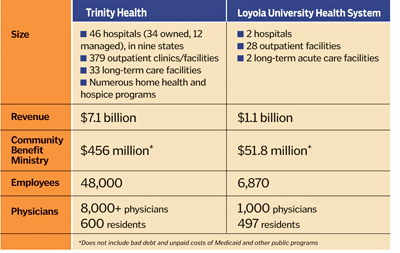Trinity Health plans to acquire Loyola University Health System from Loyola University Chicago. The transaction is subject to continued due diligence and regulatory approvals. The goal is to have it completed by July 1.
Participants said the deal between the country's fourth largest Catholic health system and the Jesuit university is intended to strengthen and preserve Catholic health care, Catholic medical education and medical research. Financial terms of the deal have not been made public by the parties.
Trinity Health is based in Novi, Mich., and it owns or manages hospitals in nine states. The Loyola acquisition would make the Chicago area its first market in Illinois.
In announcing the planned consolidation, leaders of both health systems said fusing Trinity Health's managerial strength and its focus on safety and high-quality care with Loyola's intellectual capital and large academic physician practice could generate innovative and efficient health care delivery models. Regionally and nationally, those structures could improve clinical care and reduce care inequities related to racial disparities or insurance status, they said.

Joseph R. Swedish, Trinity Health's president and chief executive, expressed confidence that the venture will be "a catalyst for Catholic collaboration in Chicago and across the nation."
According to a joint statement released in early March, "A unified ministry would be in a stronger position to advocate more effectively to improve health care for all and would have a greater ability to influence and transform national health care."
Fr. Michael J. Garanzini, SJ, president of Loyola University Chicago, said that the institution had conversations with local and national Catholic health care systems before giving Trinity Health the nod.
If the deal comes to fruition and Loyola University Health System becomes part of Trinity Health, the symbiotic relationship would continue between the university and the academic health system. Trinity Health would invest in the university's health science education and research.
Dr. Paul K. Whelton is president and chief executive of Loyola University Health System, a separately incorporated subsidiary of Loyola University Chicago. He is also senior vice president for health sciences at the university. The deans of the Stritch School of Medicine and the Marcella Niehoff School of Nursing report to him.
He said the collaboration with Trinity Health would facilitate a "giant leap forward" for the academic medical system's plans for growth in patient care, education and research.
"The driver here is to ensure we have a successful health system going forward," Whelton said. The health system struggled financially, but parties to the deal said it had engineered a significant financial and operational turnaround in the past few years.
"We have been growing as a health system. We've been doing well," Whelton said. "We certainly realize going forward that having more scale is a good thing."
Whelton said Trinity Health will support Loyola University Health System's tri-part mission to deliver outstanding patient care, leading-edge research and rigorous medical, nursing and graduate education.
The medical school recruits 20 percent of its students from underserved populations and encourages graduates to practice in their communities, Whelton said, adding that a desire to serve others is a requirement for admission into the medical school. The Jesuit-rooted training that doctors and nurses receive at Loyola University extends the reach of Catholic health care "over and above what we do in the direct provision of care in the Chicago marketplace," he said.
Under the terms of the deal, the university would maintain ownership of the schools of medicine and nursing and of the related research enterprises. Whelton said Trinity Health and the university have agreed to make a combined contribution of $150 million over three years to build, equip and staff a medical research enterprise on the flagship Maywood campus of Loyola University Medical Center.
As a Jesuit institution, Loyola University has a "moral obligation to be active in research so we can improve the ways one goes about prevention, so we can improve the approaches to treatment to reduce the burden of illness and we can be at the table to be a force in the direction of research in this country," Whelton said.
Maywood is in Chicago's western suburbs, where Loyola University Health System has a large footprint. Its medical center, a quaternary care hospital, has 570 beds. It has a closed medical staff of academic physicians. It is the state's only Catholic academic medical center. Its sister facility, Gottlieb Memorial Hospital in Melrose Park is a 250-bed community hospital. Loyola University Health System is part of a joint venture that operates two long-term acute care hospitals.
The health system has 28 primary and specialty care facilities in the northern Illinois counties of Cook, Will and DuPage. "We see more patients outside of our main campus than we do on our main campus," Whelton said. "We have between 600,000 and 700,000 ambulatory care visits every year. We cover about 1.5 million lives in the western suburbs of Chicago." Whelton said the system employs from 500 to 600 full-time physicians, and their practices will become part of Trinity Health.
Whelton described Chicago as a fragmented health care market, one with no dominant system. "You have lots of different providers and lots of different Catholic health care providers. I think that is going to change over time, and I think we will see consolidation that is independent of health care reform. I think that is the direction health care is going," he said.
Consolidation is already in the works for two large Catholic providers of health services in northern and central Illinois. Provena Health of Mokena, Ill., and Resurrection Health Care of Chicago are in talks to merge.
Copyright © 2011 by the Catholic Health Association
of the United States
For reprint permission, contact Betty Crosby
or call (314) 253-3477.